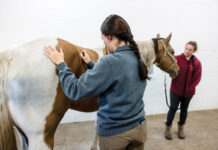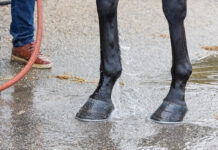Lameness
Symptoms: Variable, depending on the problem and the horse’s tolerance for pain. The lameness may be easily detected or obscure, especially if more than one leg is affected.
Sometimes the affected area is swollen and/or warm, but this is not always the case. Swelling or warmth over tendons may suggest that the tendons are involved, but many other problems can cause similar symptoms.
Fractures usually cause immediate and severe lameness. In some cases, the leg may look crooked or wobbly; in others, it may only appear swollen in the area of the fracture. The horse may be in extreme pain.
What to do: Lameness may or may not be an emergency. If you think your horse has a fracture, call your veterinarian immediately. For other lamenesses (not associated with external wounds), call during regular hours.
For a fracture, restrain your horse to keep him from hurting himself even more. If necessary, apply a support wrap or splint to immobilize the fracture, especially if you’ll need to trailer your horse to the veterinary hospital. Wrapping/splinting techniques vary depending on the type of fracture and its location, so ask your vet for specific instructions. Do not administer any medication unless instructed to do so by your vet.
For a non-fracture lameness that isn’t due to a hoof abscess, hose the area with cold water for 20 to 30 minutes and apply a support wrap, if possible. Confine the horse to a well-bedded stall or small paddock.
Outlook: The prognosis for lameness depends on the location and severity of the injury causing it, as well as the horse’s response to treatment. Some horses recover completely; in others, the lameness can be managed with various types of therapy, including medication, physical therapy and rest. In some cases, the horse may not be rideable, but may recover sufficiently for breeding and/or companion duties.
Back to Horse Health Glossary
This article originally appeared in the 2012 issue of Horses USA. Click here to purchase the most recent issue.






